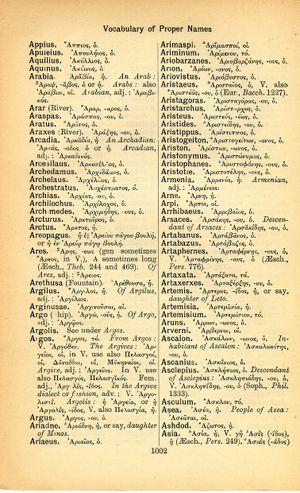Asia: Difference between revisions
τῶν δ᾽ ὀρθουμένων σῴζει τὰ πολλὰ σώμαθ᾽ ἡ πειθαρχία → But of those who make it through, following orders is what saves most of their lives (Sophocles, Antigone 675f.)
m (Text replacement - "<b class="b2">Ion</b>" to "''Ion''") |
(6_2) |
||
| Line 7: | Line 7: | ||
<b class="b2">The people of Asia</b>: οἱ Ἀσιανοί. | <b class="b2">The people of Asia</b>: οἱ Ἀσιανοί. | ||
}} | |||
{{Lewis | |||
|lshtext=<b>Ā̆sĭa</b>: ae, f. (in [[regard]] to the [[quantity]] of the A, cf. Jahn ad Ov. M. 5, 648), = [[Ἀσία]]>.<br /> Orig., a [[town]] in [[Lydia]]; [[afterwards]] the [[region]] [[around]] it; [[hence]],<br /> <b>B</b> Adj.: Ā̆sĭus, a, um, of [[Asia]]: [[palus]], the [[marshy]] [[region]] on the [[river]] [[Cayster]], Verg. A. 7, 701; cf. id. G. 1, 383, and Hom. Il. 2, 461; [[Asia]], a [[nymph]], Verg. G. 4, 343; cf. Hyg. Fab. prooem.—<br /> In an extended signif., [[Asia]] Minor, Cic. Imp. Pomp. 6; Hor. Ep. 1, 3, 5; Verg. A. 2, 557; Sen. [[Troad]]. 6; Vulg. Act. 19, 26; 21, 27 al.—Hence also for Pergamos, Liv. 26, 24; Vell. 2, 4; and, as a Roman [[province]], or Proconsular [[Asia]], κατ' ἐξοχήν (ἡ ἰδίως καλουμένη Ἀδία, [[Strabo]], 17, p. 118), [[Asia]] comprehended [[Mysia]], [[Lydia]], [[Caria]], and [[Phrygia]]; cf.: Namque, ut [[opinor]], [[Asia]] vestra [[constat]] ex Phrygiā, Cariā, Mysiā, Lydiā, Cic. Fl. 27; id. Imp. Pomp. 6; Vulg. Act. 2, 9; 6, 9; ib. 1 Cor. 16, 19 et saep.— Hence,<br /> <b>B</b> Ā̆sĭus, a, um, adj., Asiatic (cf. [[Asiaticus]]): [[villa]], Varr. ap. Non. p. 466, 3.— For [[Troas]], Ov. M. 13, 484.—<br /><b>III</b> In a [[still]] wider [[sense]], the [[whole]] of the [[quarter]] of the [[globe]] [[Asia]] ([[hence]] the [[distinction]] [[Asia]] Minor, Oros. 1, 2), Plin. 5, 9, 9, § 47 sqq.—A [[poet]]. form, Ā̆sis, īdis, [[Asia]], Ov. M. 5, 648; 9, 448. ††<br /> <b>2</b> asĭa, ae, f.; [[among]] the [[Taurini]], rye, in [[pure]] Lat., [[secale]], Plin. 18, 16, 40, § 141. | |||
}} | }} | ||
Revision as of 08:22, 13 August 2017
English > Greek (Woodhouse)
Ἀσία, ἡ, V. γῆ Ἀσίς (-ίδος), ἡ (Aesch., Pers. 249). Ἀσιάς (-άδος) χθών, ἡ (Eur., Ion, 74), Ἀσιάς γῆ, ἡ (Eur., Ion, 1586), or Ἀσιάς, ἡ, alone (Eur., Ion, 1356), or Ἀσιᾶτις (-ιδος) γῆ, ἡ (Eur., And. 1).
The continent of Asia: ἤπειρος Ἀσίς, ἡ (Aesch., P. V. 735).
Asiatic, adj.: Ἀσιανός. Fem. adj., V. Ἀσιάς (-άδος), Ἀσιᾶτις (-ιδος) (Eur., Tro. 1219; El. 315), Ἠπειρῶτις (-ιδος) (Eur., And. 159).
The people of Asia: οἱ Ἀσιανοί.
Latin > English (Lewis & Short)
Ā̆sĭa: ae, f. (in regard to the quantity of the A, cf. Jahn ad Ov. M. 5, 648), = Ἀσία>.
Orig., a town in Lydia; afterwards the region around it; hence,
B Adj.: Ā̆sĭus, a, um, of Asia: palus, the marshy region on the river Cayster, Verg. A. 7, 701; cf. id. G. 1, 383, and Hom. Il. 2, 461; Asia, a nymph, Verg. G. 4, 343; cf. Hyg. Fab. prooem.—
In an extended signif., Asia Minor, Cic. Imp. Pomp. 6; Hor. Ep. 1, 3, 5; Verg. A. 2, 557; Sen. Troad. 6; Vulg. Act. 19, 26; 21, 27 al.—Hence also for Pergamos, Liv. 26, 24; Vell. 2, 4; and, as a Roman province, or Proconsular Asia, κατ' ἐξοχήν (ἡ ἰδίως καλουμένη Ἀδία, Strabo, 17, p. 118), Asia comprehended Mysia, Lydia, Caria, and Phrygia; cf.: Namque, ut opinor, Asia vestra constat ex Phrygiā, Cariā, Mysiā, Lydiā, Cic. Fl. 27; id. Imp. Pomp. 6; Vulg. Act. 2, 9; 6, 9; ib. 1 Cor. 16, 19 et saep.— Hence,
B Ā̆sĭus, a, um, adj., Asiatic (cf. Asiaticus): villa, Varr. ap. Non. p. 466, 3.— For Troas, Ov. M. 13, 484.—
III In a still wider sense, the whole of the quarter of the globe Asia (hence the distinction Asia Minor, Oros. 1, 2), Plin. 5, 9, 9, § 47 sqq.—A poet. form, Ā̆sis, īdis, Asia, Ov. M. 5, 648; 9, 448. ††
2 asĭa, ae, f.; among the Taurini, rye, in pure Lat., secale, Plin. 18, 16, 40, § 141.

